-
-
FeaturesคุณสมบัติPenyelesaianRecursosFiturCaracterísticas精选功能功能特點المزايا
-
Solutionsโซลูชั่นPenyelesaianSoluçõesSolusiSoluciones解决方案解決方案الحلول
-
IntegrationsการผสานรวมIntegrasiIntegraçõesIntegrationsIntegraciones集成整合服務دمج مع تطبيقات أخرى
-
Affiliate/Partnersพันธมิตร/พันธมิตรทรัพยากรAfiliasi/Rakan KongsiAfiliados/ParceirosAfiliasi/MitraAfiliados/Partners联盟/合作伙伴聯盟/合作夥伴شريك
-
ResourcesจองการสาธิตSumberRecursosSumber dayaRecursosالموارد資源中心
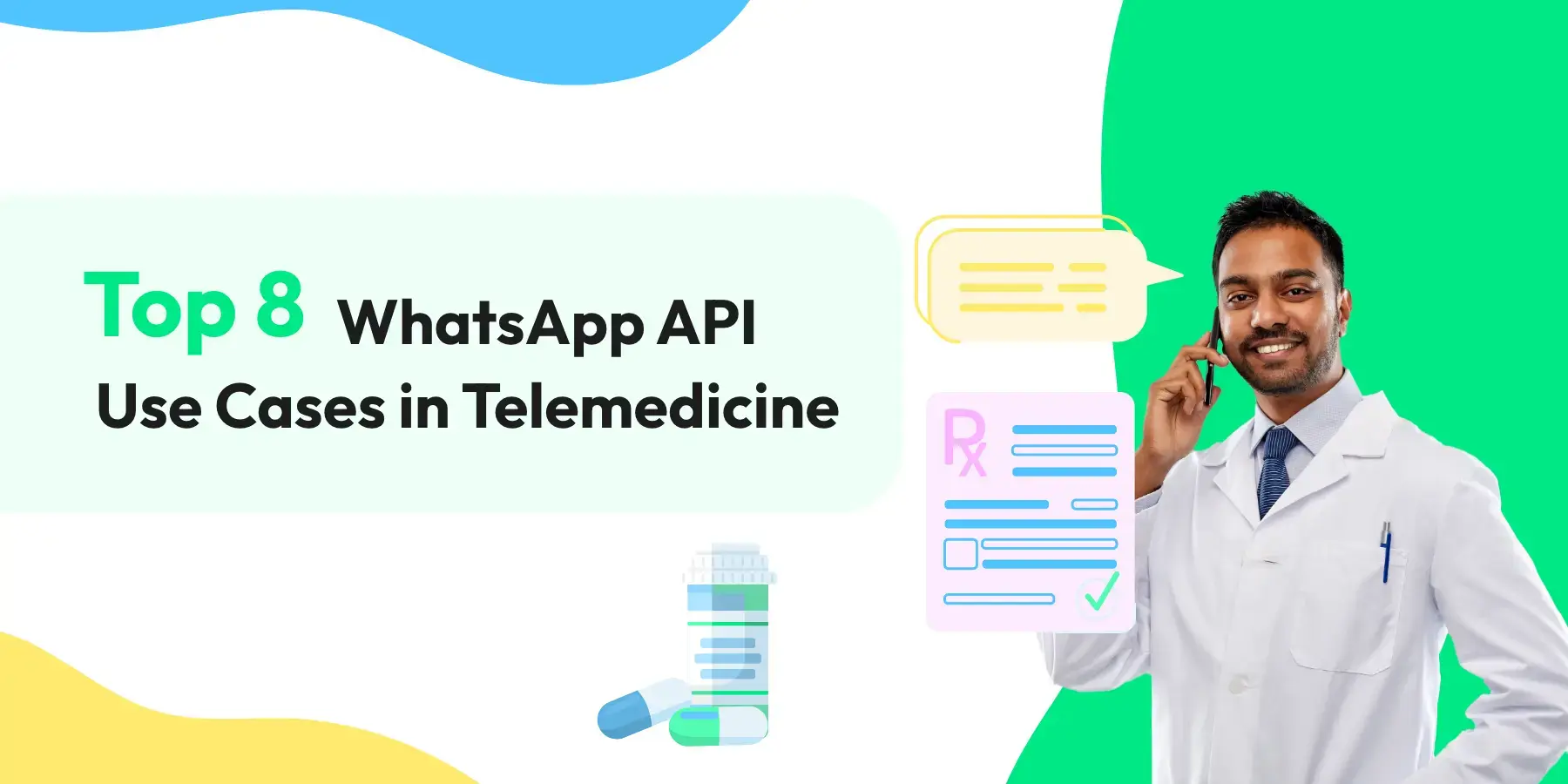
Top 8 WhatsApp API Use Cases in Telemedicine
During the Covid-19 pandemic, we saw the potential of WhatsApp to bolster communication in healthcare initiatives when WHO used it to disseminate pandemic-related information efficiently. It also implemented a WhatsApp helpline and a chatbot service to automate one-on-one interactions at scale.
But WhatsApp is not just limited to this. With WhatsApp Business API, healthcare organizations and professionals can access multiple WhatsApp healthcare use cases.
And today, we are going to discuss that. We’ll deep dive into the top 8 WhatsApp API use cases in telemedicine services. But before doing that, let’s have a look at the role of telemedicine services in healthcare.
The Role of Telemedicine Services in Healthcare
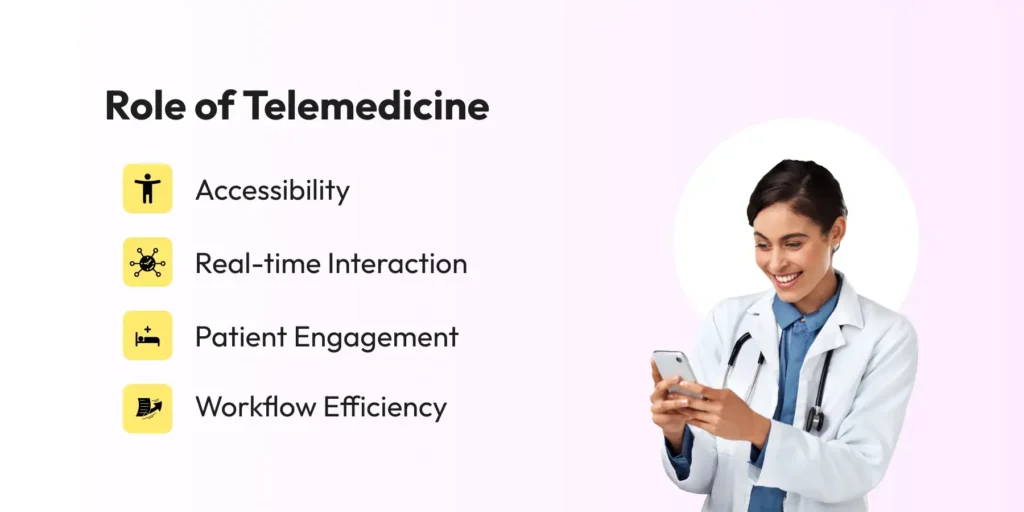
Telemedicine is the practice of providing healthcare facilities remotely through telecommunications technology. Telemedicine services have emerged as a transformative force in modern healthcare as it impacts various aspects of healthcare delivery, including:
- Accessibility
- Real-time Interaction
- Patient Engagement
- Workflow Efficiency
Let’s have a look at how Telemedicine services impact all aspects of healthcare in detail.
a. Accessibility and Reach
One of the biggest advantages of telemedicine is that it breaks down the geographical barriers to bring healthcare services to every individual, regardless of their location.
This is life-saving for rural areas where access to healthcare facilities is limited. Telemedicine enables patients to consult with specialists located far away, reducing the need for travel and other associated expenses.
At the same time, telemedicine also enables healthcare providers to extend their reach beyond traditional clinic settings, reaching patients in their homes or workplaces.
It also enables them to go beyond traditional medical care to encompass mental health counseling, therapy, and wellness coaching.
In short, telemedicine facilitates expanded accessibility which ensures that every individual irrespective of their location gets access to timely medical care.

b. Real-Time Interaction and Patient Engagement
Communication in healthcare is essential. Telemedicine facilitates exactly this with real-time interaction between patients and healthcare providers, resulting in a more immediate and responsive healthcare experience.
Patients can connect with healthcare professionals through video conferencing, instant messaging, or virtual consultations, eliminating the need for in-person visits for certain conditions.
Not only this, but telemedicine platforms also come with features such as appointment reminders, medication alerts, and health-tracking tools, further empowering patients to manage their health proactively.
In some instances, if the communication in healthcare isn’t quick, it can have fatal repercussions. That’s exactly where Telemedicine comes into the picture as it plays a crucial role in emergency response and disaster management by enabling remote triage, medical consultations, and care coordination during crises.
In emergency situations, such as natural disasters or pandemics, telemedicine helps alleviate strain on healthcare facilities, facilitates timely medical interventions, and ensures continuity of care for affected populations.
Also Read: Why Everyone in Healthcare is Talking About Healthcare API!
c. Streamlined Workflow and Efficiency
Telemedicine makes the lives of both healthcare professionals and patients easier. Patients enjoy reduced wait times as virtual consultations can often be scheduled more quickly than traditional in-person visits.
Whereas, healthcare professionals maximize their potential along with managing their schedules via virtual consultations and in-person appointments.
Telemedicine also improves coordination and collaboration among healthcare professionals by facilitating seamless communication.
Healthcare professionals can also offer personalized care delivery to the patient with the help of digital health records and telemonitoring devices.
Top 8 Use Cases of WhatsApp API in Healthcare & Telemedicine
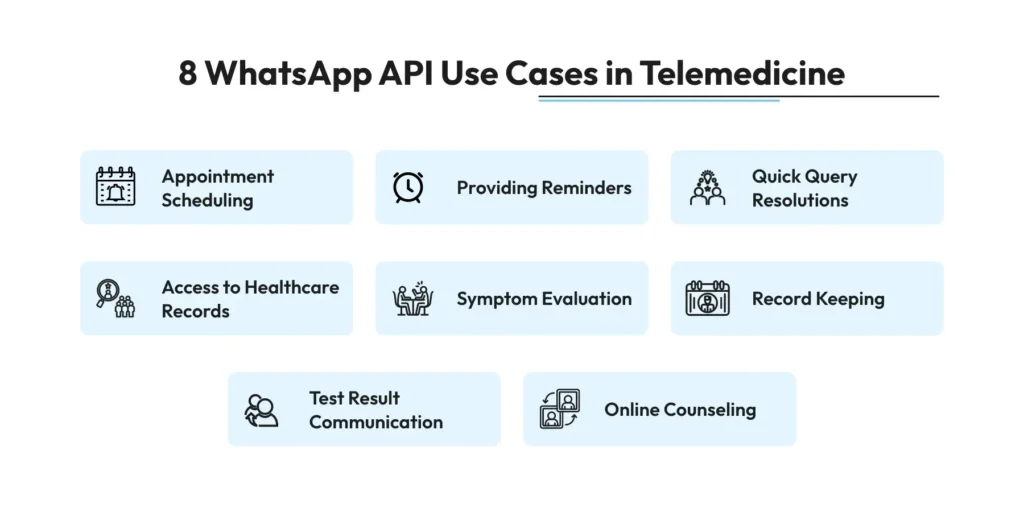
1. Appointment Booking
A WhatsApp chatbot can revolutionize appointment booking in telemedicine by providing an automated, convenient, and efficient solution for patients and healthcare providers alike.
You can create a WhatsApp chatbot using Wati. Wati’s intuitive and no-code flow-builder allows you to create a simple as well as complex WhatsApp chatbot as per your healthcare requirements.
Let’s see how it works with the help of an example.
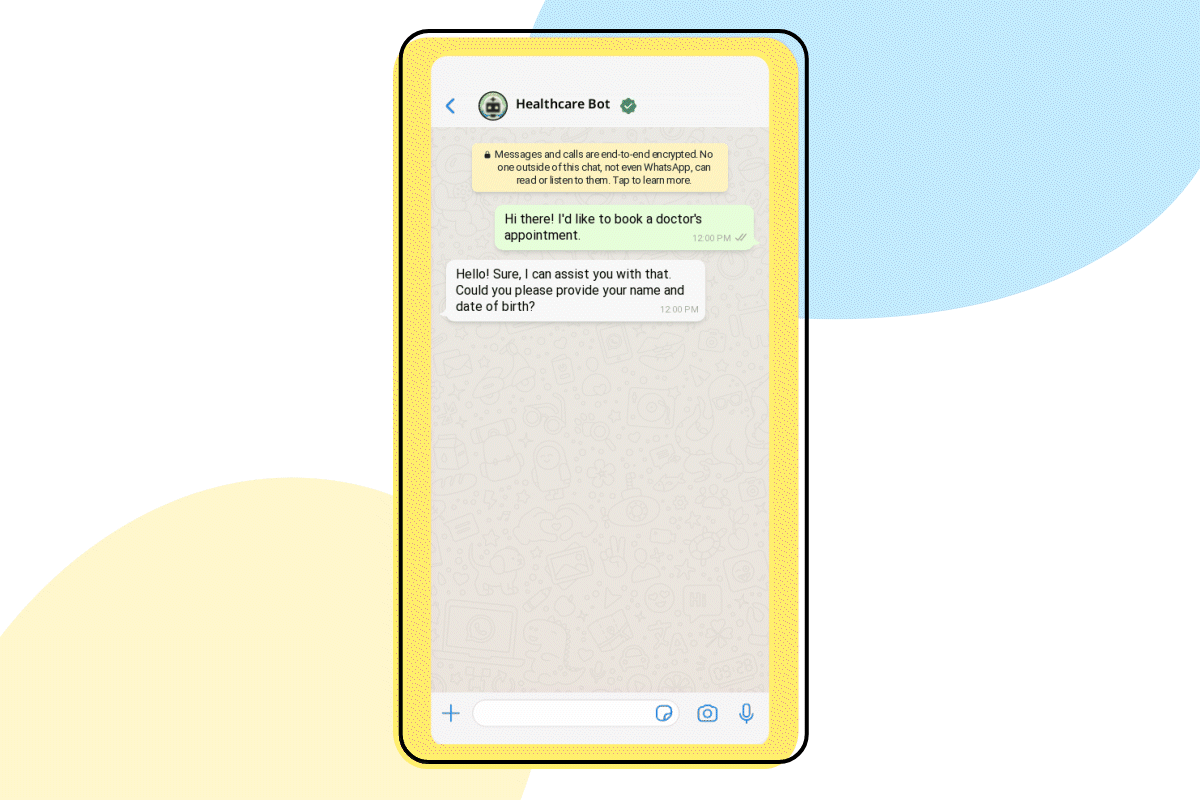
In the above GIF, we can see how the healthcare chatbot collects relevant information and helps the user to schedule an appointment in a matter of a few seconds.
You can also add buttons in the chat to make the overall appointment scheduling process easy and efficient.
Using WhatsApp chatbots for appointment scheduling comes with a lot of benefits. Let’s have a look at them one by one.
1. 24/7 Availability: A WhatsApp chatbot is accessible round the clock, allowing patients to book appointments at their convenience, even outside of regular business hours.
2. Instant Responses: Patients receive immediate responses to their appointment inquiries and can quickly confirm or reschedule appointments without waiting for human intervention.
3. Personalized Interactions: Chatbots can be programmed to interact with patients in a personalized manner, addressing them by name and tailoring responses based on their preferences and past interactions.
4. Increased Efficiency: Healthcare providers can automate appointment scheduling tasks, freeing up staff time for more critical responsibilities and reducing the likelihood of scheduling errors.
5. Enhanced Scalability: As patient volumes increase, chatbots can effortlessly handle a higher volume of appointment requests without the need for additional human resources.
Also Read: Streamline Online Medical Appointments With WhatsApp API
2. Providing Reminders
WhatsApp can play a crucial role in providing reminders, ensuring patients stay on track with their treatment plans, medication schedules, and appointments.
Here’s how WhatsApp can help in providing reminders for healthcare.
a. Appointment Reminders
Healthcare providers can use WhatsApp to send automated appointment reminders to patients, reducing the likelihood of missed appointments and improving overall attendance rates.
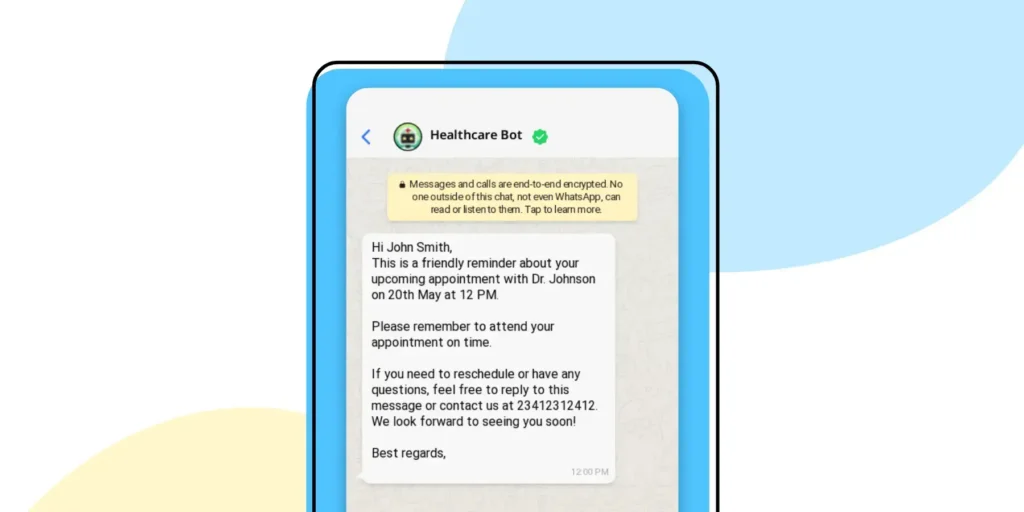
b. Medication Reminders
Patients can receive personalized medication reminders via WhatsApp, prompting them to take their medications at the prescribed times. This helps in improving medication adherence and health outcomes.
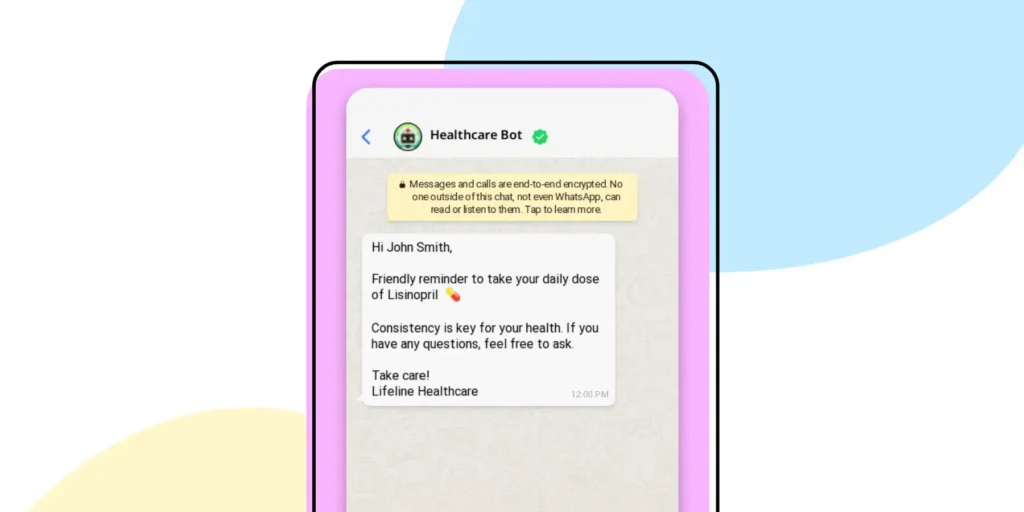
c. Follow-up Care Reminders
After a medical procedure or consultation, healthcare providers can send follow-up care instructions and reminders to patients via WhatsApp, ensuring they adhere to post-treatment protocols and guidelines.
d. Health Monitoring Reminders
For patients managing chronic conditions or undergoing long-term treatments, WhatsApp can be used to send regular health monitoring reminders, such as reminders to track blood pressure readings, glucose levels, or other vital signs.
3. Quick Resolutions to Patient Queries
WhatsApp enables healthcare providers to offer quick resolutions to patient queries by facilitating instant communication. Patients can easily message their questions or concerns, and providers can respond promptly, often within minutes.
This real-time interaction reduces waiting times for patients, enhances their overall experience of communication in healthcare.
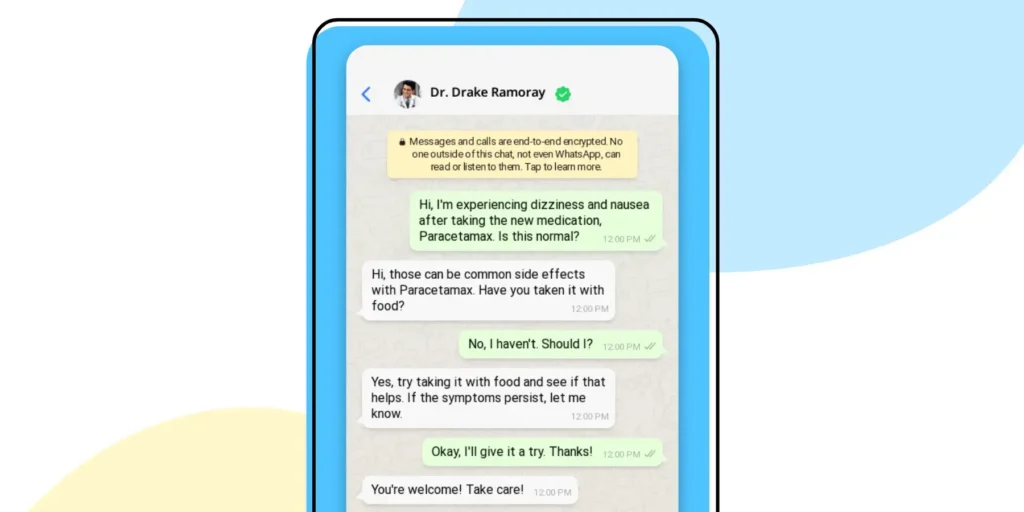
Additionally, healthcare teams can utilize WhatsApp’s multimedia capabilities to share relevant resources, such as educational materials or instructional videos, further aiding in resolving queries efficiently.
4. Access to Patient Health Records
The WhatsApp API facilitates secure access to patient health records for healthcare organizations by enabling patients to send their medical information directly to their healthcare providers.
Integrated with existing electronic health record (EHR) systems, the API ensures encrypted transmission of sensitive health data, maintaining patient privacy.
Healthcare providers can seamlessly receive and access patient health records within their workflow, streamlining communication and improving efficiency. With encrypted messaging, the API ensures data security during transmission, adhering to privacy regulations.
5. Symptom Evaluation
There have been times when we are unclear what exactly we are suffering from. And then we Google only to find we have Cancer 💀
With WhatsApp, you can save yourself from this mini-heart attack. There are WhatsApp chatbots that can evaluate your symptoms accurately by asking you a series of questions. If it’s unable to diagnose your condition, it can always direct you to the right professional for the correct diagnosis.
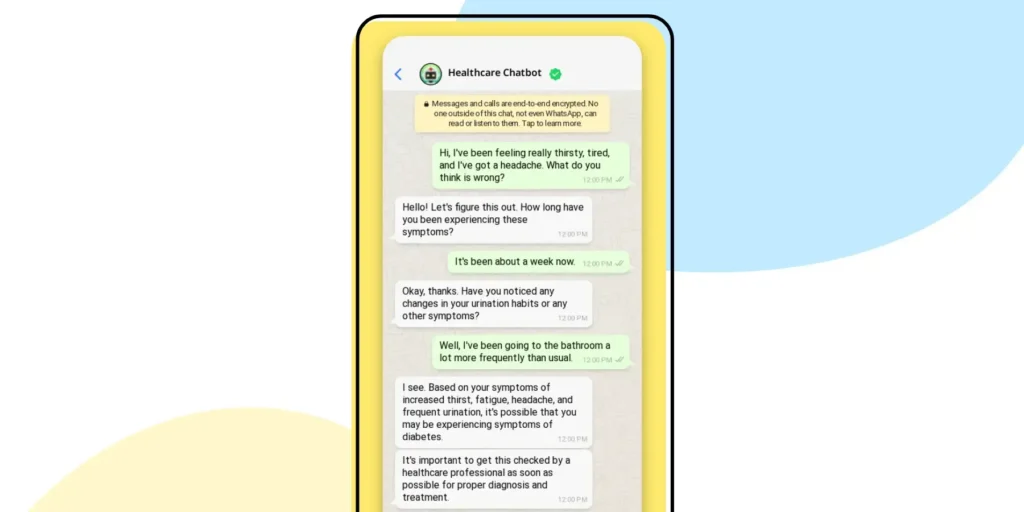
This symptom evaluation via WhatsApp chatbot is a game-changer for those people who aren’t sure whether or not they need to see a doctor. At the same time, this type of communication in healthcare via bots resolves all basic queries, ensuring that the healthcare professionals only get those complex queries that actually need their expertise.
6. Record Keeping
Record keeping is a task in itself, especially for large healthcare organisations that deal with tens of thousands of patients on a regular basis. WhatsApp for healthcare aids such organisations in record-keeping through several mechanisms.
Let’s have a look at them one by one.
a. Text-Based Documentation
Healthcare providers can use WhatsApp to send text messages documenting patient consultations, treatment plans, medication instructions, and other essential details. These messages serve as a digital record of patient care activities and can be referenced for continuity of care.
b. Media Sharing for Visual Documentation
WhatsApp allows healthcare professionals to share images, videos, and documents related to patient conditions, diagnostic tests, and treatment outcomes. This visual documentation supplements text-based records, providing a more comprehensive view of patient health status over time.
c. Voice Messaging for Detailed Updates
Voice messaging features enable healthcare professionals to provide detailed updates on patient conditions, treatment responses, and care instructions. These voice messages serve as audio records of verbal communications, ensuring accurate documentation of important discussions and decisions.
d. Timestamps for Chronological Tracking
WhatsApp automatically timestamps messages and media files, providing a chronological record of communication activities. This timestamped data helps healthcare professionals track the sequence of events, appointments, and interventions related to patient care. In a nutshell, this feature makes communication in healthcare easily trackable.
e. Group Chats for Collaborative Documentation
Healthcare teams can create group chats on WhatsApp to collaborate on patient care and document multidisciplinary discussions. Group chat transcripts serve as collective records of team interactions, facilitating coordination and continuity of care across different healthcare providers.
f. Search Functionality for Retrieval
WhatsApp’s search functionality allows healthcare professionals to quickly retrieve specific messages, media files, or information within chat histories. This enables efficient access to relevant patient records during consultations, follow-ups, and decision-making processes.
7. Test Result Communication
Healthcare professionals can use WhatsApp to communicate test results efficiently by securely sharing results with patients and colleagues. They can send messages containing test outcomes, accompanied by explanations and recommendations, ensuring the timely delivery of important information.
WhatsApp also allows healthcare professionals to share images of test reports or graphs for clearer illustration.
Here, the patient or the healthcare professional doesn’t have to worry about privacy issues as all the messages on WhatsApp are encrypted.
Secondly, healthcare professionals also use group chats to discuss among healthcare teams for collaborative interpretation of results and formulation of treatment plans. Voice messaging also helps them in offering detailed explanations or addressing patient queries, enhancing clarity and understanding.
8. Online Counseling
Online counseling is another facet of communication in healthcare that WhatsApp can take care of. Here, WhatsApp can support online counseling by providing a convenient and accessible platform for therapeutic communication.
Counselors can engage with clients through text-based messaging, voice calls, and even video calls, offering flexibility in communication methods based on client preferences and needs.
This asynchronous communication allows clients to express themselves at their own pace, promoting a comfortable and confidential environment for discussing sensitive topics.
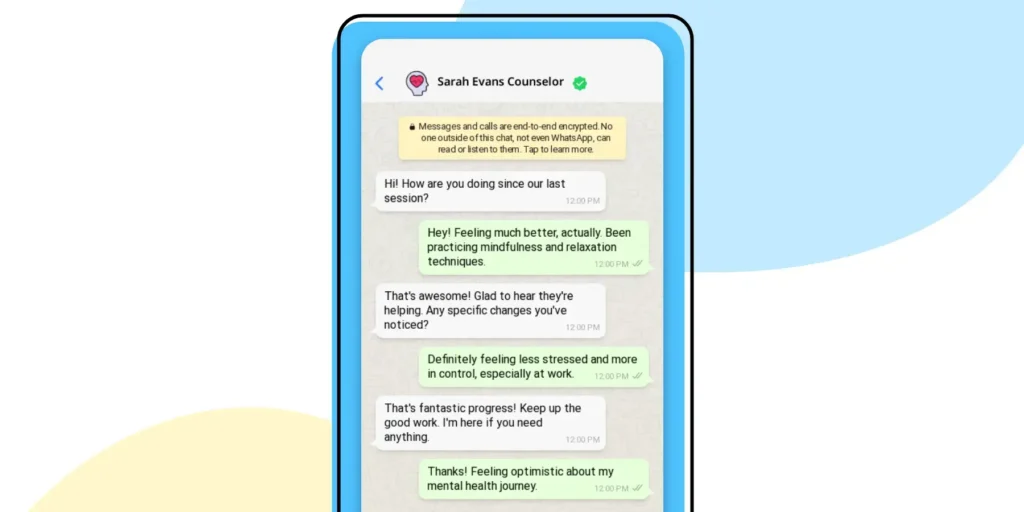
Counselors can share resources, worksheets, and psychoeducational materials via WhatsApp to supplement counseling sessions and facilitate client reflection and growth.
Additionally, WhatsApp’s encryption features can help maintain the privacy and security of client communications, fostering trust and confidentiality in the therapeutic relationship.
Empower Your Telemedicine Platform with Wati
These top 8 WhatsApp API use cases for telemedicine undoubtedly offer a spectrum of benefits. But to implement them into your healthcare organization, you need a robust WhatsApp Business Solution provider that can adeptly execute these WhatsApp healthcare use cases in the best way possible.
And when it comes to WhatsApp BSP, look no further than Wati. As a premier WhatsApp BSP, Wati streamlines the implementation of these WhatsApp API use cases for telemedicine, simplifying what might otherwise be a complex process.
With its features like no code chatbot, shared inbox, broadcast messages, and custom notifications, you would be able to implement almost every use case outlined above.
So, what are you waiting for? Empower your telemedicine platform with Wati today. You can see Wati in action with our 7-day free trial. You can also schedule a demo or contact us for more information.
Frequently Asked Questions
1. How are hospitals using WhatsApp to enhance patient care in the healthcare industry?
Hospitals are leveraging WhatsApp as a communication tool to enhance patient care by simplifying user journeys, offering advantages in terms of speed and accuracy, reducing the need for in-person appointments, and streamlining the process of providing assistance to patients.
WhatsApp is a pivotal tool for communication in healthcare, facilitating the sharing of crucial medical information, mental health counseling, payments, collaboration within hospital staff, collecting patient feedback, and bot-to-human handover of interactions.
2. What is required for hospitals to fully utilize WhatsApp’s capabilities?
To fully harness WhatsApp’s capabilities, hospitals need to have the WhatsApp Business API. This API enables hospitals to integrate WhatsApp into their systems and leverage its features for efficient communication and patient care. The integration of WhatsApp as a tool for communication in healthcare ensures seamless interaction and enhances the overall patient experience.
3. What challenges exist in using WhatsApp in healthcare?
While WhatsApp offers many advantages for communication in healthcare, challenges exist in maintaining patient data privacy and compliance with legal standards. Healthcare providers must ensure patient confidentiality and comply with local regulations, navigating the intricacies of communication in healthcare while adhering to WhatsApp’s policies on business conduct.
4. Can WhatsApp be used for telehealth purposes?
Yes, WhatsApp can serve as a platform for telehealth purposes when integrated with secure messaging solutions like Wati. Integration with such services ensures secure communication channels and compliance with healthcare regulations, enabling healthcare organizations to effectively provide telehealth services while maintaining the integrity of communication in healthcare.
5. How does WhatsApp ensure data and identity protection?
WhatsApp provides complete protection to data and identity through end-to-end encryption and business verification. This ensures that the communication and information shared on the platform remain secure and confidential.
6. How has WhatsApp been used during the COVID-19 pandemic?
Recent updates to the WhatsApp Business API have allowed pharmacies to send medical service updates related to COVID-19. This has enabled healthcare organizations to keep patients informed and provide timely information and updates during the pandemic.
7. How can adding WhatsApp to a communication strategy enhance customer engagement in healthcare?
Adding WhatsApp to a communication strategy can create a unique customer experience and enhance customer engagement in healthcare. It allows for easy access to information, quick resolutions to queries, and personalized communication, improving overall patient satisfaction and engagement.
Latest Comments